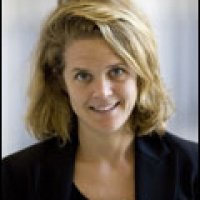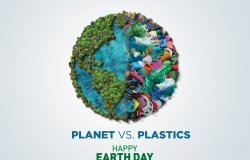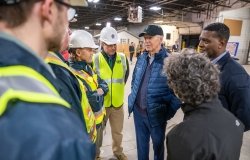Book Launch: The Tenth Parallel: Dispatches from the Fault Line Between Christianity and Islam
The latitudinal tenth parallel — located 700 miles above the equator — constitutes a "faith-based fault line" between Islam and Christianity, said Eliza Griswold at the launch of her latest book.
Overview
The latitudinal tenth parallel — located 700 miles above the equator — constitutes a "faith-based fault line" between Islam and Christianity, said Eliza Griswold at the launch of her latest book, The Tenth Parallel: Dispatches from the Fault Line Between Christianity and Islam at the Wilson Center on September 16, 2010. The former Wilson Center public policy scholar traveled more than 9,000 miles to six countries along the line. One quarter of the world's Muslim population lives north of the line, while one-fourth of the world's Christian population lives south of it.
Religious Conflict and Environmental Peacemaking
The tenth parallel is vulnerable to intense religious conflicts, exacerbated by the imposition of colonial-era national borders. Griswold collected stories from tribal leaders, presidents, and missionaries that reveal subtle linkages between religious conflict, politics, and environmental change. "Every single religious conflict I saw had a worldly trigger, whether land, oil, or water," she said, because these groups tend to self-identify along lines of religion, "even over any kind of ethnicity."
In the town of Abiay, Sudan, Griswold described a fight "over who's going to get that oil, and how they're going to divide themselves. Religion comes in as an overlay, because the north pushes the people of the south farther south by saying, 'Guess what? We need that land, and why? Because our Muslim people need that land for their cattle,' but underneath that land runs a river of oil."
But in these origins of conflict Griswold finds an avenue to peace: "Environmental challenges seem to work well in areas of religious conflict" as a neutral meeting ground, she said.
For example, in the Nigerian city Kaduna, where Christians and Muslims have clashed violently, two former mortal enemies and self-avowed fundamentalists work together to deprogram the youth they trained to protect their faith through violence. At the Interfaith Reconciliation Center, Pastor James (who lost an arm to a group of Muslims) and Imam Muhammed Nurayn Ashafa use practical aspects of living to encourage interfaith dialogue. During Griswold's visit, it was fuel-efficient cookstoves, "because that's one of the things Christians and Muslims fight about...whether land, water, oil."
Such concrete examples of environmental peacemaking offer future policy options for mitigating conflicts in other areas. "The tenth parallel is one of the most sensitive environmental zones in the world...so do I think it's replicable? Absolutely," said Griswold.
The Changing Demographics of Religion
Today, "four out of five of the world's one billion Muslims don't live in the Middle East; they live in Africa and they live in Asia. More than half of them live along the tenth parallel, and about half of the world's two billion Christians also live along the tenth parallel," sais Griswold. She explained that the migration of Islam to Africa stopped along the tenth parallel because of the tsetse flies and the devastating sleeping sickness they carried.
Later, colonial-era European missionaries arrived, many with "the express purpose of stopping Islam from winning Africa, from spreading south of the tenth parallel," she said. For example, Britain's division of Sudan restricted Muslims to the north and Christians to the south, where missionaries developed and constructed the southern Sudanese state.
"Many of these places are failed states...and religion has come in largely to fill the gaps," said Griswold. "The world is breaking down on tribal lines and religion is the largest tribe there is, more so than ethnicity, more so than other global markers."
Based on population projections, Griswold pointed out that "the center of Christianity, in 2050 will be on the tenth parallel...in Muslim Nigeria."
Historical Echoes
Historically, aid and development work along the tenth parallel "was not a secular enterprise," Griswold said, since most of the aid workers were Christian missionaries. "So there is a very long history and a very strong association between the West and Christianity in many, many places," she pointed out.
This history has long affected American foreign policy and perceptions of the United States abroad. According to Griswold, "foreign policy [has] come to reflect the interests of selective groups of Americans." For that reason, "we really need to call for caution in how we allow ourselves to be represented and in the diversity of voices that get out there," she advised.
For example, the evangelical preacher Franklin Graham met with Bashir in 2003 to ask for the right to proselytize in northern Sudan. In exchange, Bashir hoped to avoid being added to "the American 'hit list' after Afghanistan and Iraq," reported Griswold. Graham told her that in response he took out a George W. Bush re-election pin and said, "Mr. President, I understand you'll be talking to my president later today. Why don't you tell him you're his first voter here in the Sudan?"
In the same vein, Griswold cautioned against perpetuating American ignorance of Muslim culture:
We, especially in America, are extremely aware of this fight over who speaks for God. Because I think, when we see what's happening on the steps of the Lincoln Memorial or at Ground Zero, we're looking at a struggle inside of a broader Christian context between Franklin Graham and Barack Obama over who a true Christian is. And Islam becomes the easiest bogeyman. The quickest way to whip up fear in followers is to create a shared enemy.
"The single most important finding of the book," Griswold concluded, "was that the clashes within religions, the clashes between Christians and Christians, Muslims and Muslims, over who has the right to speak for God, are the most important and most overlooked religious conflicts going on today."
Drafted by Shawna Cuan and edited by Meaghan Parker.
Speaker

Hosted By

Middle East Program
The Wilson Center’s Middle East Program serves as a crucial resource for the policymaking community and beyond, providing analyses and research that helps inform US foreign policymaking, stimulates public debate, and expands knowledge about issues in the wider Middle East and North Africa (MENA) region. Read more

Environmental Change and Security Program
The Environmental Change and Security Program (ECSP) explores the connections between environmental change, health, and population dynamics and their links to conflict, human insecurity, and foreign policy. Read more
Thank you for your interest in this event. Please send any feedback or questions to our Events staff.









